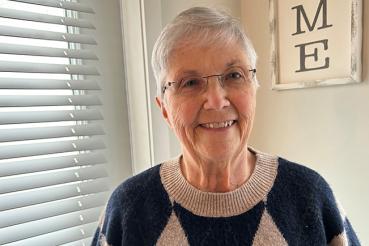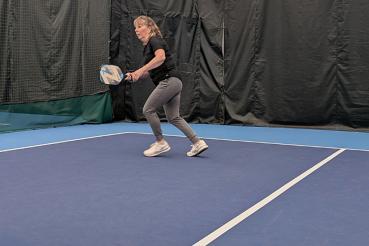When I was 13, I lost two of my grandparents to lung cancer, and six months later my dad died of lung cancer. Then in my 20s, both my mom and close aunt died of lung cancer.
Needless to say, I was devastated and felt helpless, so I started doing advocacy work with LUNGevity Foundation, a national lung cancer organization. I also began getting scans every few years. All was good until 2009. I was 39 years old, had four small children and was president of LUNGevity, so there just aren’t words that can describe how I felt when I was diagnosed with lung cancer, the same disease that I literally watched kill both of my parents.
Foreign territory
I have been in and out of treatment for the past 8 1/2 years. Lung cancer will be a lifelong roller coaster ride for me, but because of a better understanding of lung cancer biology, advancements in treatments, and my dedicated, passionate, collaborative care team, the cancer can be managed as a chronic disease, for now.
Hearing the words “you have lung cancer” is one of those things you can’t understand unless you have experienced it, but I will try to describe it. Imagine you are going about your everyday life and suddenly you are drop-kicked into a foreign country; you don’t know the language, the culture is unfamiliar, you don’t know what’s expected of you, you don’t have a map — and yet you need to figure out how to survive. Now imagine how overwhelming it would be to navigate this foreign territory yourself. On the flip side, imagine how different your experience would be if there was a team waiting to help you with all of the above.
Putting patients in the center
There are so many buzzwords flying around like patient-centered care, shared decision making, value-based care, etc., but what do they mean and what do they look like in a clinical setting? It’s pretty simple — they mean putting patients in the center, not the middle. There’s a difference. When patients are in the middle they are forced to navigate a fractured system and can fall through the cracks. When patients are in the center, care is organized around them. Patients need to know they are being heard and they need to be involved in their care. It’s not a new idea, there’s just ambiguity surrounding the definition.
I have an extensive history with my care team at Rush, from before I was a patient, and they have always been patient-centered. There is a culture that exists, a philosophy of care that is reflected by all of the staff, who all have the patient in the center. They treat the patient, not just the disease. Knowledge, experience, access to research and cutting-edge treatment are all important when looking for the “best” care, but so is having a team that believes the patient’s spirit, family, dignity and goals are just as important. That is, and has been for decades, the culture of my care team.
When I was diagnosed, my biggest fear was that my kids would have to go through what I went through and suffer the loss of a parent at a young age. So my team has always understood that my preferences for treatment had to be guided by the impact it would have on my family, and at times that has meant not following the traditional approach or standard of care.
Passion, sympathy
And the care extends beyond the clinic. My care team fights with me, and for me. Lung cancer is their job, and it’s a hard one. But beyond their profession they act on their passion and sympathy to raise awareness for lung cancer. Despite watching the disease destroy, debilitate and take the lives of their loved ones and patients they grow to love and care about still, “off the clock” they advocate for us. To be able to maintain this dedication through so much devastation all these years is true compassion that cannot be learned.
I can’t emphasize enough that this kind of care changes, and saves, lives. I have had the chance my parents didn’t, and I am confident that I will be here for my children and important milestones for many years to come — in large part because of my care team.



